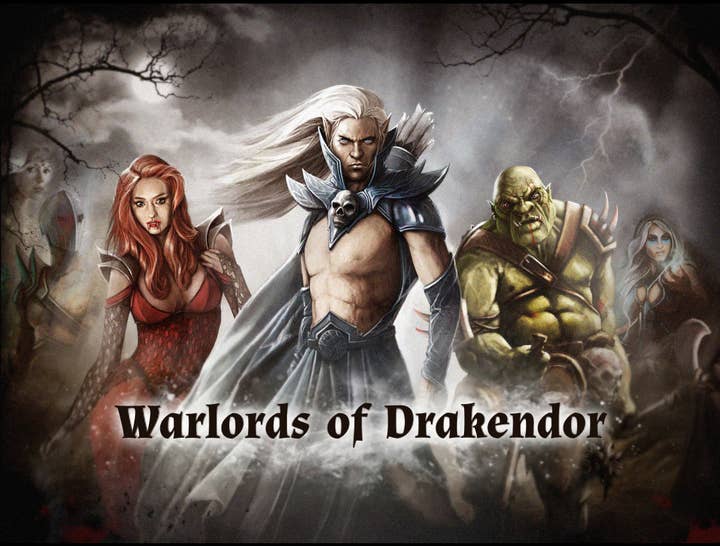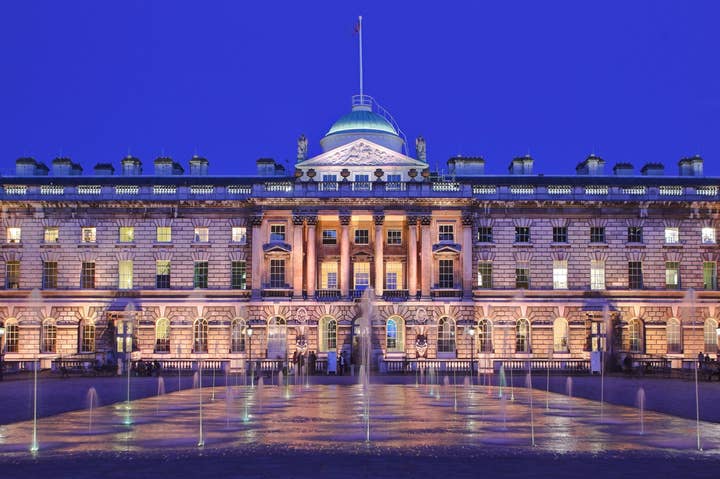"I think we owned the industry once and we let it go"
Chris Lee on why a city with an industry as vibrant as London's still needs Playhubs.
Andres Tallos knows how to set himself a challenge. "We're a small studio, there's just three of us," he tells me as he shows me his card-based strategy game. "I want to take on Hearthstone. I think we can do better. It's all about thinking about it as a long-term service, as a hobby for people rather than just a game."
When you talk to the residents of an incubator co-founded by the team behind London Venture Partners and Chris Lee, a man with an incredibly prescient Midas touch, you expect them to be pretty confident. Nonetheless, chatting to the teams in residence at London's Playhubs, I'm still impressed by the obvious ambition.
This isn't the cockiness of an inexperienced young developer talking, either. Tallos was previously the Director of business strategy for the EMEA region at Gree. He's an established professional with a real understanding of the workings of the business. The confidence isn't bluff, it's genuine.
Whether he'll manage to topple Blizzard's house of cards is a moot point - Tallos is just one of a group of entrepreneurs I meet at Playhubs who have a strong and solid business plan in place, married to a focused game concept and a clear market. They're not the naively idealistic graduates I was expecting.
"We're a small studio, there's just three of us. I want to take on Hearthstone. I think we can do better."
Andres Tallos
Later, I meet Ryan Bousfield. His one man VR start-up, Wolf and Wood, has already produced horror title "A Chair in a Room", with a demo that's seen 160,000 downloads from the Cardboard share store, not bad for something he largely produced in his spare time. Bousfield wasn't even originally involved in games - until earlier this year he was the creative director of a Shoreditch design agency. Now, he's taken the plunge as a full time developer, bringing another angle to Playhubs repertoire.
"It's quite a spectrum," says Lee when I ask him about the general age and experience of the residents. "I would say that we have two or three applicants per person that we accept. We don't want to be a home for start-ups, a home for indie bands, because it's cool to be a start-up. It actually isn't cool to be a start-up. It's cool to run a profitable business that can hire people sustainably and look after them. So some of the people who apply don't get through because it's obvious that they want to do it just for fun and we want to do it for fun and profit.
"The perfect profile is two or three people who have experience who have an idea, have a shell for the company, have some money from family, friends, redundancy, whatever, but they're not venture-backed, they haven't got investment or institutional funding. They really initially just wanted some space, or introductions to platform holders.
"Our stronger guys have probably been in the industry a while longer. Andreas spent quite a lot of time at Gree. A super senior guy who'd been given lots of opportunities to take on more employment, but thought, 'if there's ever going to be one, this is my moment.' So it ranges. I would have expected it to be something of a younger crowd, but that's probably something to do with the limits of our networks."

To be fair, Lee's network is pretty extensive. An ex-VP of both EA and Activision who co-founded Freestyle and Media Molecule, as well as finding time to be an early investor in many of the UK's leading mobile free-to-play studios, his acumen is somewhat legendary. Add London Venture Partners to the mix, with regular consultation from David Gardner, referred to with a mixture of reverence and affection as 'DG', and you have an incubator and accelerator which seems bound to produce bumper crops of healthy start ups.
But eight months after the foundation of the project, there hasn't yet been a big name graduate. As Lee and his general manager Ted Maxwell concede, it's something that needs addressing.
"The thing we need fundamentally more than anything else is a hit, someone who's graduated from here and had a hit," says Lee. "We need to create that. There's a period of heavy lifting between here and now where we communicate the value of what we're doing to people.
"The UK's ecosystem has historically been driven by work for hire. All of the businesses that were built prior to Facebook and mobile, you could argue weren't really businesses but umbrellas under which you were given contract work"
Chris Lee
"The UK's ecosystem has historically been driven by work for hire. All of the businesses that were built prior to Facebook and mobile, you could argue weren't really businesses but umbrellas under which you were given contract work. You just had 100 contractors, really, which were being paid by the same company. That was the case with Freestyle - Media Molecule was a bit different - but effectively Freestyle was just one big work for hire behemoth. As soon as someone decided to turn the taps off, it was over. So we never really learned how to create a business. How do we market our products? Protect them? Build relationships with the consumer? Those things were all done by somebody else.
"So probably our greatest challenge is that we help solve problems that entrepreneurs don't know exist. Studios fail, or never get started for a number of small reasons, not single big ones. Death isn't immediate anymore. Maybe when there were 200 person studios waiting on a contract that didn't get renewed, then death was relatively immediate. Now we're in a different business model where death comes in small doses.
"Maybe you set up your share cap table wrong, you've got the wrong investment, you hired the wrong person, you didn't protect your intellectual property, you chose the wrong analytics tools. It's all these little bad decisions. You didn't understand Games Tax Relief, you didn't know Apple pays 60 days after the end of the month. All those things - until you fail, you don't know that's what kills you.
"So when we're trying to communicate the value of Playhubs to somebody, because there are so many things that, even by osmosis, you will learn, it's difficult to communicate that until someone's experienced that failure. Our challenge has been communicating that failure is a super easy path to go down.The point isn't that this is a hunting ground for me, or for LVP, but ultimately we do need people to associate us with success, with good graduates."
"We're almost at the end of the launch excitement," adds Maxwell, sharp and engaging. "There was a splash when it was announced and that's sort of continued through our networks, so there are people still finding out about us through our connections. The next six months is when Playhubs needs to be growing on its own. On the one hand, that's finding and introducing ourselves to new audiences, on the other it's delivering on promise. We're in our grace period, but that's not indefinite.

"We're going to start having stuff to say for ourselves that isn't LVP, isn't from Chris. Our teams can start to speak for themselves about what they've achieved that they couldn't have without Playhubs. We're doing a lot beneath the surface."
It's not just getting bums on seats, either. Playhubs isn't about having someone pay for a desk for two years and then go back to developing accountancy software. It's designed to have a quick turnaround, meaning that a regular influx of new teams is vital.
"The need for a flow of people applying is significant," says Lee. "We only want people to be here for around six months maximum - this isn't a residence. It's not a cheap office. It's to get your head together, figure things out, learn as much as you can. You have to expect to fend for yourself at some point. Success is being here for a relatively short period of time."
Jeremy Wilkinson of Neon Souls has been at Playhubs for a couple of months, working on Wild Dawn, a "beautiful touch based adventure about a girl who brings a barren world trapped in eternal night back to life." When he and his team joined, they were, by his own admission, full of lofty ideas about what they were creating, but had little grounding in the practicalities of business. That all changed with a pitch conversion with 'DG' which Wilkinson calls "transformative."
"I think that we're probably the people who have had the most visible journey from being here," he says with enthusiasm. "It's had the biggest impact on what we're doing - the game itself, the studio as a whole. It's really been amazing, it's transformed the way we look at everything.
"It's changed me from a scrappy indie who just wanted to make something really cool and arty, to wanting to make a business. It's made me think about that vision and how to achieve it."
Jeremy Wilkinson
"It's changed me from a scrappy indie who just wanted to make something really cool and arty, to wanting to make a business. It's made me think about that vision and how to achieve it.
"One of the biggest things that I didn't realise before I joined was that as an indie I'd be able to raise really good funding from people like LVP to build a studio. I thought it would be much more scrappy and organic. This has opened my eyes to a different route."
"It's a good example of the distance between an idea and a business," says Lee of Wilkinson's project. "That's really what we're trying to explain to people. That's an enormous distance. The majority of people arrive with an idea, we're trying to make sure they leave with a business. A lot of the simple stuff shocks people, the stuff that went on but they weren't aware of when they were an employee. Things like contracts, IP protection, trademarks. How expensive analytics tools can be."
For some of the teams, the benefits have been as much about contacts as learning the commercial ropes. Izzy Rahman's Vertelex Studios is a group of friends who graduated together from Goldsmiths. The concept for their first mobile game is tight, innovative and unique - based around a mechanic which Rahman sees as being hugely adaptable. Young and full of energy, Rahman fits my preconceptions about the developers I thought I'd find here much more closely, but he's not short on long term ambitions either.

"We want to be the team that's known for having the balls to go out there and address the issues that aren't normally addressed in games, delivering experiences that the big studios might be a bit afraid of because they're risky," he says, convincingly. "I think as indies we have that privilege. We use the phrase avant garde a lot. We want to do new things and create a whole new genre."
Given the freshness of Vertelex's concept, I'd be surprised if the team didn't turn out to be one of the big successes that Lee and Maxwell are so keen on. Rahman says that the leadership has been nothing short of inspiring.
"I was quite surprised, I thought it would be all business, because that's something that a lot of the teams are actually lacking here. Working and speaking with the founders of this place is worth the entrance fee alone. These guys are pretty much the pop stars of the industry. When it actually hits you that you're working some of the first guys who recognised Supercell...It's really exciting. It gives you a lot of confidence. Playhubs is an incredible place to network, everyone is so passionate. London needs something like this."
London isn't the only city to come to this conclusion. Various other collectives have sprung up around the country, signifying a new era of community and collaboration amongst small studios. For Lee, it couldn't have come soon enough.
"Ultimately your success comes from your talent as a group of individuals, the culture you create and your ability to create a product that people love. That can't be stolen"
Chris Lee
"This was the core principle of Playhubs at the very beginning," he explains. "We realised that everyone else in the world was talking more, sharing more, than we were. Finland is doing phenomenally well because everyone is willing to share. They see no issue with that. Games are on the app store. If you want to look at them, you can. You can reverse engineer what's there if you really want to steal ideas. You can figure out what they're making. So why worry about it?
"Ultimately your success comes from your talent as a group of individuals, the culture you create and your ability to create a product that people love. That can't be stolen, you've either got it or you haven't. In the UK we've built up this anxiety, partly, I think, because of that work for hire culture. If I'm building a racing game and I want to pitch it to EA, it's probably not a good idea to talk to you about your racing game because you're probably pitching to the same people. So I think that's where it comes from. But it's no longer relevant. We still keep hold of it, but it doesn't matter anymore.
"That lack of ability to really share our successes and our data and our metrics... I think that's really holding us back. We even worry about non-solicits and non-competes...If someone wants to move, there's nothing you can do about it, they'll move. You just need to build a studio they won't dream of leaving. We need to deal with these problems in different ways. So that's why I think of Playhubs more as a community, because we're trying to build somewhere that people share."
So why hasn't this happened organically? The UK is a powerhouse of creative talent and cultural exports, the games industry a perfect marriage of technical and artistic innovation. Everyone knows everyone else. Why don't we have our Silicon Valley? For Lee, it's still about the business education.
"You look at the companies that have become tremendously successful, Activision, Bungie, Rockstar, Sony, it's all Brits at the top of those companies. I think we owned the industry once and we let it go"
Chris Lee
"You look at the companies that have become tremendously successful, Activision, Bungie, Rockstar, Sony, it's all Brits at the top of those companies. I think we owned the industry once and we let it go - to a large extent because of the brain drain to places like Canada. I think that the brain drain has stopped, I think things like the videogames tax relief has helped a lot, as has the fact that there are people like LVP and Initial Capital and Connect Ventures putting money into strong UK companies, although there could be more capital available. It'd be nice if there were more angels, VCs, even more strategics looking at games.
"But what we still lack is this true understanding of the commerciality of games, the business of games. I think that's inherent in the fact that we've built companies predominantly as servants to others, historically. That's meant that our commercial ability to build a sustainable business over time, that owns its own IP, that owns its relationship with the consumer, owns its cash flow, can survive alone, that's lacking. We don't have the commercial calibre of experience to build those businesses at a volume I'd like us to.
"We want to be a catalyst of that change. I personally want to help individuals who are running studios to become better at that. All the ingredients exist. The beauty of the UK is that the platform holders are all here. They're all within ten minutes walk. We shouldn't have any more excuses. We've had too many. If you're good enough, then the industry is welcoming enough for you to be successful."

